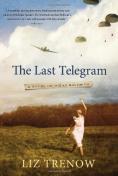BKMT READING GUIDES
The Last Telegram
by Liz Trenow
Paperback : 416 pages
1 club reading this now
1 member has read this book
"A book to savor."-Kate Furnivall, author of The Russian Concubine
We all make mistakes. Some we can fix.
But what happens when we can't?
Decades ago, as Nazi planes dominated the sky, Lily Verner made a terrible choice. She's tried to forget, but now an unexpected event pulls her back ...
Introduction
"A book to savor."-Kate Furnivall, author of The Russian Concubine
We all make mistakes. Some we can fix.
But what happens when we can't?
Decades ago, as Nazi planes dominated the sky, Lily Verner made a terrible choice. She's tried to forget, but now an unexpected event pulls her back to the 1940s British countryside. She finds herself remembering the brilliant colors of the silk she helped to weave at her family's mill, the relentless pressure of the worsening war, and the kind of heartbreaking loss that stops time.
In this evocative novel of love and consequences, Lily finally confronts the disastrous decision that has haunted her all these years. The Last Telegram uncovers the surprising truth about how the stories we weave about our lives are threaded with truth, guilt, and forgiveness.
"Sparked my interest from the start...charming."-Sharon Knoth, Between the Covers, Harbor Springs, MI
"This book will easily appeal to fans of The Guernsey Literary and Potato Peel Pie Society, and I can see it quickly becoming a favorite of book clubs."-Billie Bloebaum, Powell's Books
Excerpt
1The History of Silk owes much to the fairer sex. The Chinese Empress Hsi Ling is credited with its first discovery, in 2640 BC. It is said that a cocoon fell from the mulberry tree, under which she was sitting, into her cup of tea. As she sought to remove the cocoon its sticky threads started to unravel and cling to her fingers. Upon examining the thread more closely she immediately saw its potential and dedicated her life thereafter to the cultivation of the silkworm and production of silk for weaving and embroidery. ...
Discussion Questions
1. How does the character development of Lily tell us about the impact of war on attitudes to women working outside the home? Would this differ between the UK and the USA? 2. What does the novel tell us about the nature of grief and how we grieve? 3. Why do you think that Britain was initially reluctant to accept Jewish refugees when they already knew that those refugees were being persecuted? 4. Is Robbie a sympathetic villain? What made him the way he was? Identify the moments when we—and Lily—are able to feel sympathy for him. By the end of the book, can we find it in our hearts to forgive him? 5. Can a lie ever be considered morally defensible? 6. In the final scene, does Lily understand what her granddaughter tells her?Book Club Recommendations
Recommended to book clubs by 1 of 1 members.
Book Club HQ to over 88,000+ book clubs and ready to welcome yours.
Get free weekly updates on top club picks, book giveaways, author events and more








